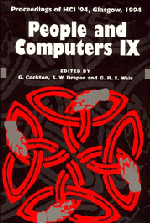Book contents
- Frontmatter
- Contents
- Preface: HCI'94 – You Probably Haven't Seen It All Before
- Part I Invited Papers
- Part II Methodology of Interactive Systems Development
- Crafting Interaction: Styles, Metaphors, Modalities and Agents
- Modelling Humans, Computers and their Interaction
- Notations and Tools for Design
- 22 XUAN: Enhancing UAN to Capture Temporal Relationships among Actions
- 23 Structured Notations to Support Human Factors Specification of Interactive Systems
- 24 Discount Dialogue Modelling with Action Simulator
- 25 Executable Task Analysis: Integration Issues
- 26 Beyond Data Models for Automated User Interface Generation
- Part VI Computer-Supported Cooperative Work
- Author Index
- Keyword Index
22 - XUAN: Enhancing UAN to Capture Temporal Relationships among Actions
Published online by Cambridge University Press: 04 August 2010
- Frontmatter
- Contents
- Preface: HCI'94 – You Probably Haven't Seen It All Before
- Part I Invited Papers
- Part II Methodology of Interactive Systems Development
- Crafting Interaction: Styles, Metaphors, Modalities and Agents
- Modelling Humans, Computers and their Interaction
- Notations and Tools for Design
- 22 XUAN: Enhancing UAN to Capture Temporal Relationships among Actions
- 23 Structured Notations to Support Human Factors Specification of Interactive Systems
- 24 Discount Dialogue Modelling with Action Simulator
- 25 Executable Task Analysis: Integration Issues
- 26 Beyond Data Models for Automated User Interface Generation
- Part VI Computer-Supported Cooperative Work
- Author Index
- Keyword Index
Summary
Time is one of the most vital properties of an interface from a user's point of view, and the TAU project aims to explore how temporal properties of user interfaces affect their usability. This paper describes the XUAN notation of the specification of temporal behaviour. This notation also provides the basis for a software tool allowing not only specification but also rapid instantiation and modification of (small) user interfaces with defined temporal behaviour. This in turn will support rapid experimentation on users that varies temporal aspects on interfaces. In this paper we describe the features we have added to the UAN in creating XUAN in order to express temporal properties of tasks.
Keywords: task description language, response time, specification.
Introduction
Time is one of the most vital properties of an interface from a user's point of view but an aspect of interaction that is neglected by HCI theorists and practitioners. Work by Teal & Rudnicky (1992) has shown that users change their interaction strategies in response to varying response delays. This change in strategy is not accounted for in Norman's theory of action (Norman, 1986) or GOMS (Card, Moran & Newell, 1983). The use of multimedia systems and CSCW systems will mean that people will be faced increasingly with time-varying interactions. Our work in the TAU project provides an experimental basis for exploring issues of time in complex interactions.
Informally we know that if mouse tracking is too slow, using the mouse becomes almost impossible.
Information
- Type
- Chapter
- Information
- People and Computers , pp. 301 - 312Publisher: Cambridge University PressPrint publication year: 1994
Accessibility standard: Unknown
Why this information is here
This section outlines the accessibility features of this content - including support for screen readers, full keyboard navigation and high-contrast display options. This may not be relevant for you.Accessibility Information
- 7
- Cited by
